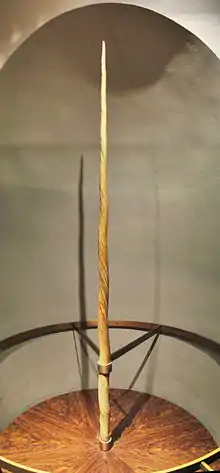alicorn
English
WOTD – 24 January 2013
WOTD – 24 January 2015

Purported alicorn offered to the Holy Roman Emperor Ferdinand I in 1540 (in fact a narwhal tusk)
Pronunciation
- (General American) IPA(key): /ˈæ.lɪ.kɔɹn/
- (Received Pronunciation) IPA(key): /ˈæ.lɪ.kɔːn/
- Hyphenation: al‧i‧corn
Noun
alicorn (plural alicorns)
- (now historical) The horn of a unicorn considered as a medical or pharmacological ingredient.
- 1930, Shepard, Odell, The Lore of the Unicorn, London: Unwin and Allen, →ISBN, Chapter VI:
- He admits that powdered alicorn will delay the death of a poisoned pigeon, but says that any other horn will do the same thing by retarding assimilation.
- 1933, Alexander Laing, The Sea Witch, Farrar & Rinheart:
- "This happens to be my last voyage. But even so, I intend no coercion. If he does not value the alicorn to the extent of ten thousand Spanish dollars, I'll keep it myself. I'm rather fond of the thing. You see, it's a genuine unicorn's horn, and they're exceedingly few."
- 1945, Patrick Henry Yancey, Origins from mythology of biological names and terms, pages 46:
- Two kinds were on the market: Unicornum Verum (Alicorn), thought to be Mammoth Tusk, and Unicornum Falsum, Narwhal tusks.
- 1982 May-June, Smith, F. G. Walton, “The Unicorn that Goes to Sea”, in Sea Frontiers: Bulletin of the International Oceanographic Foundation, volume 28, number 3, page 130:
- What a fabulous beast was the mythical unicorn — with its horse's head and hoofs, and a single horn, the alicorn, growing out of its forehead.
- 2008 April 21, McLeod, Judyth A., In a Unicorn's Garden: Recreating the magic and mystery of medieval gardens, Murdoch Books, →ISBN, OCLC 319207643, OL 25192450M, page 15:
- The horn of the male narwhal, which sailors called the unicorn of the sea, is thought to have been the unicorn's horn, or alicorn, of medieval commerce. It was very widely believed that alicorn could be used to detect poisons, and when ground and added to a potion would prevent poisoning.
- 2010 October 19, Kronzek, Allan Zola; Kronzek, Elizabeth, The Sorcerer's Companion: A Guide to the Magical World of Harry Potter, 3rd edition, New York: Broadway Books, page 297:
- Tests to verify the authenticity of alicorn—most of which involved placing spiders near the horn and observing their reactions—were numerous, but apparently few detected bogus horn, for narwhal tusks, masquerading as unicorn horn, made their way into shops across Europe.
- For more examples of usage of this term, see Citations:alicorn.
-
Etymology 2
Term already associated with unicorns and reinterpreted, popularized by Bearing an Hourglass (1984) and other fantasy novels by Piers Anthony.[1]
Noun
alicorn (plural alicorns)
- (nonstandard) A mythological creature, a mixture of pegasus and unicorn: a winged horse with a single horn on its head.
- 1984 August, Anthony, Piers, Bearing an Hourglass, Del Rey Books, published 1992, →ISBN, OL 9381602M, page 171:
- The Alicorn. He be a winged unicorn, the finest equine flesh extant, the adoration of every fair and innocent maiden. For that steed I would give anything.
- 1999 May 15, Twyligtsky <twyligtsky@aol.comSKYMAGE>, “Re: RP: First appearence!”, in alt.mythology.mythic-animals, Usenet, message-ID <19990515145319.05236.00000939@ng-fs1.aol.com>:
- A silver portal opens in the sky and a ebony alicorn stallion gallops from it the silver tips on his black wings shine in the sun's light.
- 2013 February 16, Tabitha St. Germain and Andrea Libman as Rarity and Pinkie Pie, “Magical Mystery Cure”, in My Little Pony: Friendship Is Magic, season 3, episode 13, written by M.A. Larson, 16:32:
- Rarity: Why, you've become an alicorn! I didn't even know that was possible.
Pinkie Pie: [wearing a costume horn and wings] Alicorn party!
- For more examples of usage of this term, see Citations:alicorn.
-
References
- According to Nathan2000, when asked how he came up with the term, Anthony answered, “I saw fantasy statuettes in an ad, and one was of a winged unicorn, titled an alicorn, so I figured that was the name and used it. I have not been able to verify it elsewhere.”
This article is issued from Wiktionary. The text is licensed under Creative Commons - Attribution - Sharealike. Additional terms may apply for the media files.